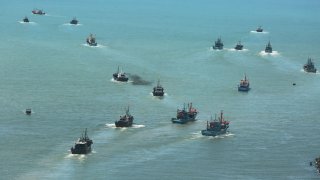
- The Philippines has drastically stepped up its patrols in the South China Sea recently, and has come into closer contact with the China Coast Guard, according to ship tracking data.
- From March 1 to May 25, 13 law enforcement or military vessels from the Philippines visited waters around the contested Spratly Islands and Scarborough Shoal at least 57 times, the Asia Maritime Transparency Initiative said.
- "This was a substantial increase over the previous 10 months … when 3 vessels were tracked making 7 total visits to contested features," the report said.
The Philippines has drastically stepped up its patrols in the South China Sea recently, and came into closer contact with the China Coast Guard, according to ship tracking data.
Between March 1 to May 25, 13 law enforcement or military vessels from the Philippines visited waters around the contested Spratly Islands and Scarborough Shoal at least 57 times, the Asia Maritime Transparency Initiative (AMTI) said in note this week.
"This was a substantial increase over the previous 10 months … when 3 vessels were tracked making 7 total visits to contested features," the report said. It pointed out that this boost in patrols is "beyond anything seen in recent years" from the Philippines.
Get Tri-state area news and weather forecasts to your inbox. Sign up for NBC New York newsletters.
The South China Sea has been a regional flashpoint in Asia, involving territorial disputes between some countries and China. The Philippines, Malaysia and Vietnam are among the countries that lay claim to parts of the waterway, but China sees much of the area — including Spratly Islands and Scarborough Shoal — as part of its territory.
The AMTI, which is part of the Center for Strategic and International Studies, pointed out that the location of patrols by the Philippines has also changed.
Before March, vessels from the Philippines "almost exclusively" traveled to and from the country's largest outpost in the Spratlys, Thitu Island.
Local
"But recent patrols have included Second Thomas Shoal, which is occupied by the Philippines but patrolled daily by China, Whitsun Reef, where the recent militia swarm was detected, unoccupied Sabina Shoal near Second Thomas, and Scarborough Shoal, where China has maintained a permanent presence since 2012," AMTI said.
The report reviewed tracking data from commercial provider Marine Traffic, and images from satellite firms Maxar and Planet Labs.
'Outsized and outgunned'
AMTI outlined an incident in May, when Chinese Coast Guard vessels tailed or chased coast guard vessels from the Philippines which are "almost always outsized and outgunned."
On May 19, the Philippines sent four ships into contested territorial seas, but were met by two Chinese ships. At least one Philippine ship was "pursued" by the Chinese, it said.
One of the China Coast Guard vessels began trailing the Philippine vessel named MCS 3005, as it sailed around one side of Scarborough.
The other Chinese vessel closely pursued a separate Philippine ship, the Habagat, on the other side before "peeling off toward" a third and larger another Philippine vessel name Gabriela Silang, AMTI said.
The Philippines appears determined to assert itself, but the country's patrols "pale in comparison" to the intensity of China's "near-permanent coastguard and militia presence," according to the report.
Manila's ships embark on "staggered tours" and spend one to two days at contested features.
"Chinese vessels, by contrast, operate as sentries, staying at targeted features for weeks at a time and usually leaving only once a replacement has arrived to continue the watch," said AMTI.
"Whether the Philippines will continue its current pace of patrols, and how China might react, is unclear," the report said. "But while Manila's combination of more public protest and greater presence seems to have had some success in dispersing Chinese vessels at Whitsun Reef and Sabina Shoal, it hasn't impacted the overall number of Chinese vessels operating in disputed waters."
Manila is "drawing greater attention, and international condemnation, to China's activities, particularly on the militia front," AMTI said.



